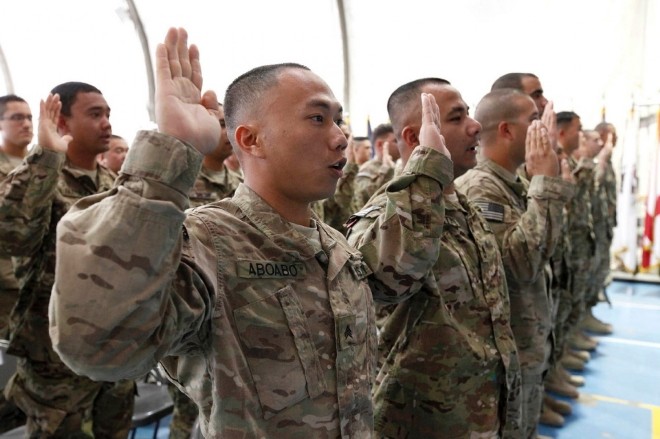
Tuesday June 27, 2017

U.S. troops are sworn in as naturalized citizens on Nov. 2, 2012, at Bagram Airfield in Afghanistan. (State Department)
The Pentagon is considering a plan to cancel enlistment contracts for 1,000 foreign-born recruits without legal immigration status, knowingly exposing them to deportation, a Defense Department memo shows.
The undated action memo, prepared for Defense Secretary Jim Mattis by personnel and intelligence officials at the Pentagon and obtained by The Washington Post, describes potential security threats of immigrants recruited in a program designed to award fast-tracked citizenship in exchange for urgently needed medical and language skills.
Additionally, 4,100 troops — most of whom are naturalized citizens — may face “enhanced screening,” though the Pentagon voiced concern on how to navigate “significant legal constraints” of “continuous monitoring” of citizens without cause, according to the memo.
Officials have assigned threat level tiers to the nearly 10,000 Military Accessions Vital to National Interest (MAVNI) program recruits, both in the service and waiting to serve, based on characteristics like proximity to classified information or how thoroughly they have been vetted.
The Defense Department launched the program in 2009. Since the program’s start, more than 10,400 troops, most of them with service in the Army, have filled medical billets and language specialties — like Russian, Mandarin Chinese and Pashto — languages identified by the Pentagon as vital to the success of military operations, but in short supply among U.S.-born troops.
Last year, officials heightened security screenings specifically for MAVNI recruits, diverting “already constrained Army fiscal and manpower resources,” the memo said.
The overtasked vetting process and heightened security risk led officials to recommend canceling enlistment contracts for all 1,800 awaiting orders for basic training, and halting the program altogether, according to the memo.
Those recruits are in what the military calls the delayed-entry program, a holding pool of recruits assigned training dates in the future. About 1,000 of them have seen their visas expire while waiting for travel orders, which would put them at risk of deportation if their contracts are canceled.
Defense Department spokesman Johnny Michael said Monday the agency is reviewing program requirements, declining to confirm the existence of the memo or ongoing internal discussions. The copy obtained by The Washington Post was signed off by Pentagon personnel official Tony Kurta on May 19. It is unclear when the memo was issued and its current status.
Margaret Stock, a retired Army officer central in implementing the program in 2009, reviewed the document and called the decision a breach of contract made in bad faith.
“It’s terrible. You trusted the Army, who delayed the process, and now they’re going to cancel your contract and have you deported,” Stock said.
Stock, now an attorney who practices immigration law in Alaska, said the Department of Homeland Security would possibly welcome the move as the Trump administration seeks to ramp up deportations.
The recruits are on government rolls detailing their addresses, phone numbers and legal statuses, making them prime targets for removal. It remains unclear if military officials would hand over that information to the U.S. Immigration and Customs Enforcement.
The Pentagon is also considering ending the careers of 2,400 part-time troops in the program who have yet to attend basic training.
Stock, the retired officer, waved off concerns of heightened risk of the MAVNI recruits cited in the memo, which says 30 percent subject to “enhanced screening” have “unmitigable derogatory information” that could bar them from service.
That term is typically used to describe applicants with characteristics that cannot be helped, Stock says, like a family member who worked for a foreign government or simply having foreign relatives.
There does not appear to have been a policy designed to grant exceptions to what would be a common occurrence among the population, she said.
“It’s okay to investigate someone with a legitimate security threat,” Stock said. “But share a characteristic they don’t like, which is they’re foreigners. They’re going to be treated as second-class citizens for their entire career.”
Stock pointed to a recent Army blunder — an enlistment of a U.S. citizen who fought alongside Russian-back separatists in Ukraine — as an example of extreme vetting that occurs for program recruits but not native-born troops.
It’s against Pentagon equal-opportunity policies, Stock said.
“You can’t treat people with a certain characteristic differently,” she said. “You don’t do surveillance on everyone who is Irish-American because Mike Flynn broke the law when talking to the Russians.”